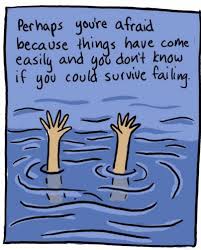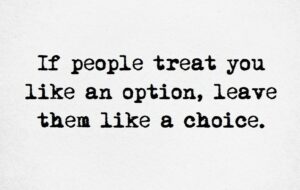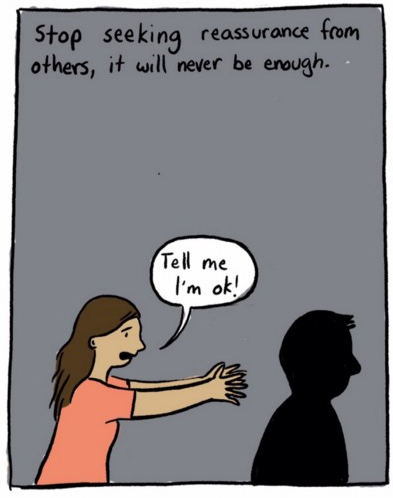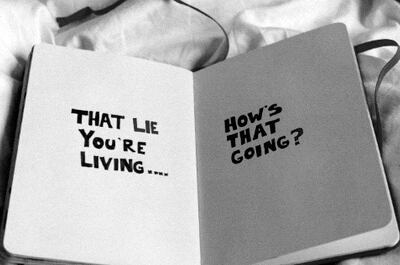In this blog post, you will learn everything you need to know about living the lie and how it can affect your life from relationships with others, family members, and friends as well as your work life! We will also suggest ways and measures for tackling self-deception (living the lie).
Contents
Understanding The Psychology Of Living The Lie
Self-deception is a lie that we tell ourselves. It takes place when we have an ulterior motive to deceive ourselves about the truth for us to feel better about it. The most common form of self-deception is called “living the lie” – which is our denial of reality, or ignoring facts that are unpleasant or inconvenient to us.
What does it mean to live the lie?

When you live the lie, you are refusing to see the truth and instead choosing to believe in a false reality that is more convenient for you. You may do this because it’s easier than facing the facts, or because you don’t want to deal with the emotional consequences of accepting reality.
When we live the lie, we are not being true to ourselves. We are hiding from the reality of our situation and pretending that everything is okay when it isn’t. This can be very damaging to our mental health, as it can lead to feelings of guilt, shame, anger, and depression.
NOTE: It’s a way of hiding from reality and living in a fantasy world instead. People who live the lie do so because they are unable or unwilling to face the facts.
Why do people fall into the trap of living the lie?

People can fall into the trap of living a lie for many reasons. One reason may be that they are afraid to face reality and its consequences because it would be too painful or overwhelming to bear, while another possibility is that people have a need to feel in control of their lives and cannot cope with uncertainty.
Living life based on self-deception can result in feeling isolated and alone as well as difficulty forming relationships with others. It may also lead to problems at work, where people struggle because they cannot be their true selves due to the lie that they live.
There is a wide range of dangers associated with living life based on self-deception and these include: facing difficulties when it comes to relationships, struggling at work, and feeling isolated from the world.
Is it a defense mechanism?
Yes, self-deception is one of the most common forms of psychological defense mechanisms that help us to deceive ourselves about the truth for us to feel better about it. The most common form of self-deception is called “living the lie” – which is our denial of reality, or ignoring facts that are unpleasant or inconvenient to us. This means that it is a way for people to protect themselves from emotional pain or harm. It can be seen as a coping strategy, as it allows people to avoid negative feelings and instead focus on positive ones.
Does living the lie serves people anyhow?

There can be some benefits to living the lie. For example, it can give people a sense of security and control in their lives. It can also make them feel like they are in control of their destiny.
However, there can be serious dangers associated with living the lie. People who live the lie often end up feeling isolated and alone. They may also have trouble forming relationships with others because they are always hiding part of themselves from others.
They may also struggle in their work and professional lives. People who live the lie often feel like they can’t be true to themselves, and this prevents them from being authentic in their work relationships.
Dangers of Living The Lie

For some people, living a life of self-deception has serious implications on their work-life as well as on their relationships with family and friends.
When people live the lie, they are not being true to themselves. They are hiding from the reality of their situation and pretending that everything is okay when it isn’t. This can be very damaging to our mental health, as it can lead to feelings of guilt, shame, anger, and depression.
People who live a lie often feel isolated and alone as well as difficulty forming relationships with others. It may also lead to problems at work, where people struggle because they cannot be their true selves due to the lie that they live.
What are some common lies that people tell themselves?
There are many different lies that people tell themselves. Some of the most common ones include:
- “I’m not good enough”
- “I can’t do this”
- “Everyone is out to get me”
- “It’s not my fault”
What are their serious implications-
On Their Work-life
When people tell themselves these lies, it often hurts their work-life.
- For example, if someone tells themselves “I’m not good enough”, they may start to doubt their abilities and this could lead to them making mistakes at work.
- If someone tells themselves “I can’t do this”, they may give up before they have even started.
On Their Relationships

When people tell themselves these lies, it can also hurt their relationships.
- For example, if someone tells themselves “I’m not good enough”, they may start to feel insecure in their relationship and constantly worry that the other person doesn’t love them or want to be with them anymore.
- If someone tells themselves “Everyone is out to get me”, they may be suspicious of others and this could cause their other relationships to suffer.
- If someone tells themselves “It’s not my fault”, they may be less likely to take responsibility for their actions and this could lead to them having conflict with others.
Preventing Living The Lie Syndrome
Signs you are living the lie
If any of these signs resonate with you, then you may be currently living the lie:

- Feel like you can’t be yourself around others
- Are always hiding part of yourself from others
- Feel guilty, ashamed, or angry about who you are
- Feel like you’re not in control of your life
Practical Tips And Techniques
There are some things that people can do to avoid falling into the trap of living a lie.
Educate Yourself
First, they need to understand what self-deception means and how it can affect their lives. You can read more about it in our articles such as denial in psychology, etc.
Develop Self-awareness
Second, they should be aware of the warning signs that indicate that they may be living a lie. These warning signs include:
- Feeling like you are not good enough,
- Constantly doubting yourself,
- Feel like everyone is out to get you, and
- Taking no responsibility for your actions.
Practice Honesty
Third, people need to be honest with themselves and with the people around them. This means being truthful about:
- How you feel,
- What your goals are, and
- What you want in life.
It can also mean being willing to admit when you are wrong and accepting responsibility for your actions.
Have a Support System
Fourth, it is important to have a support system of family and friends who will help you through difficult times. This support system can help to prevent people from falling into the trap of living a lie by reminding them that they are good enough and capable of achieving their goals.
Seek Professional Help
Fifth, it is important for people who struggle with self-deception to seek professional help if necessary. A therapist may be able to provide guidance and support and can help people to understand the root causes of their self-deception.
Experts View On Living The Lie

There is no one answer to this question as there is no one way to define “living the lie”. However, most experts would agree that living a lie can be very damaging to our mental health and can lead to us feeling isolated and alone.
Experts are of the view that it is important to foster honesty in our lives so we can be true to ourselves and avoid living a lie. It is also helpful to have people around you who will support your goals, help you deal with difficult times, remind you of how capable you are when doubts creep up on you and remind you that it is okay to make mistakes.
Experts also agree that seeking professional help if necessary can be beneficial and some people find assistance from a support group helpful as well. This could include family members, friends, or other individuals who are going through the same thing and would like to share their experiences to overcome self-deception.
Expert Remark
“The truth is, most people who are living a life of self-deception don’t realize it. They think they’re being completely honest with themselves and everyone else but the reality is very different.”
Talking To a Professional
It is important not to be ashamed or embarrassed about living a lie and seeking help. Many people struggle with this issue for years before they seek professional assistance but the sooner you get help, the better your chances are of breaking free from self-deception.
Many individuals go through therapy to overcome their struggles with self-deception. A therapist will be able to help you understand the root causes of your self-deception and provide guidance on how to overcome it.
If you do not feel comfortable talking to a therapist, there are also many support groups available that can offer you the same level of assistance. These groups are usually facilitated by individuals who have struggled with self-deception in the past and have found a way to overcome it.
Conclusion
In conclusion, living the lie can be very damaging to our mental health and can lead to us feeling isolated and alone. People need to be honest with themselves and with the people around them to avoid falling into the trap of living a lie. It is also helpful to have a support system of family and friends who will help you through difficult times.
As self-deception can be a very harmful thing that leads to us living a life that is not true to ourselves. It can damage our mental health, relationships, and work-life. However, there are ways to overcome self-deception if we are willing to admit that we are struggling, seek help from a professional or group of supporters, and practice being honest with ourselves.
If you are looking for affordable Online Counseling MantraCare can help: Book a trial therapy session


